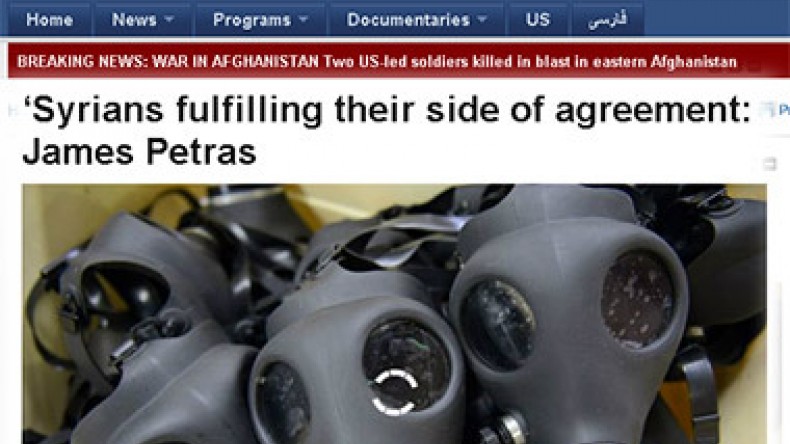
Syrians fulfilling their side of agreement: James Petras
Press TV has conducted an interview with James Petras, Professor Emeritus, Binghamton University, about Syria’s chemical weapons obligations under the new agreement with Syria furnishing full details to the OPCW as required.
- What about this situation now that Syria has submitted its list of chemical arsenal to the Organization for the Prohibition of Chemical Weapons. Will it be sufficient enough? Because already we see the United States and its Western allies are already trying to add more pressure here to Damascus. Your take?
- Well, I think the Syrians are fulfilling their side of the agreement.
I think this is a very positive step and it should be recognized as such and the process should proceed as the original agreement between Russia and the Americans agreed at the time.
What I think is important... is that the US and its Western allies do not backtrack and claim that this isn’t fulfilling the agreement. And I think this is the danger - that Washington will seek to find some pretext for undermining a process, which is moving ahead successfully in accordance with the original agreement.
I think there is no possibility that the Syrian government can put a full inventory before a period of time. I think that the timeframe needs to be enlarged to take into account the large quantity and site of where these weapons are deposited and I think this is an important ingredient.
Finally, I think it’s very important to keep in mind that Washington cannot expect the Syrians to pay the over one billion dollars that is going to be required to destroy those; and they have to locate a place where this can take place. And I think these are crucial tactical issues that could play an important role.
There is no way in the world that these chemical weapons can be destroyed immediately in Syria. And particularly with the military costs embroiled in the current warfare with the insurgents and the extremists are receiving arms, the cost is prohibitive.
I think the United States government and its allies who have raised the issue of destroying the weapons have to make a very important financial contribution and also the Russians and the US have to decide where these weapons of mass destruction will be destroyed and that’s going to take a considerable amount of time perhaps much longer than one year.
So, what needs to be... the agreement has to be fulfilled without any pretext from the West.
- Your point - without any pretext form the West - What about that? Do you think there is enough gray area in here just from the points you’ve brought up for example the one billion dollars the Syrian government of course is not likely to be able to do that; or the location where this arsenal should be destroyed.
With that lack of clarity is it likely that the United States and its allies left that part of it vague enough that perhaps if Damascus cannot, because of the situation both monetarily and being able to do this as far as the location, that it could give the US and its allies an excuse to do what they wanted to do in the beginning and that was to attack Damascus if they say they cannot meet this type of deadline?
- I think we can’t take that off the table. I think we have to look at the recent history of military intervention: the French in Mali; NATO in Libya; the arming of the terrorists in Syria; the sanctions against Iran. That’s clearly a history, which brooks ill for any peaceful resolution.
On the other hand we have to take account of the tremendous rise in opposition to new wars of the United States and Western Europe and Asia and the fact that legislative bodies in England, France, the United States, Italy and elsewhere including Germany are no longer willing to rubber stamp these war efforts.
We have to realize that Israel has totally discredited itself with its land grabs and Palestine and its shooting of school boy protesters that these are weighing against a military (intervention into Syria).
And furthermore, the fact that the new president in Iran has made strong overtures to a negotiation and settlement. And apparently these are so overwhelming that Washington now has to take them into account and even a warmonger like Obama has stated that he’s going to reach out to President Rouhani and test the waters - whatever that means.
But at least if there is a move toward a settlement with Iran, that cannot be accompanied by a new war, a NATO war in Syria - that would undermine the possibilities of a US rapprochement with Iran.
So, given these factors, the domestic opposition, discrediting of the main push for war from Israel and the pro-Israel lobby of the United States, the weakening of that; the strengthening of the peace forces led by President Rouhani, I think it’s an even balance whether Washington can pursue a new war policy in the face of these new developments.
Newsfeed
Videos






























